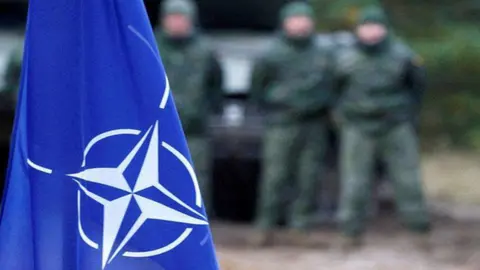Ukraine war marks NATO's 75th anniversary

In the midst of the conflict with Russia, the foreign and defence ministers of the member countries of the North Atlantic Treaty Organisation (NATO), who are meeting today and tomorrow in Brussels, want military and financial support to be permanent and programmatic instead of the current system of donations.
At the meeting, organised to mark the 75th anniversary of the signing of the treaty creating the military organisation, the Russian invasion of Ukraine was the first item on the agenda. Founded in 1949, the North Atlantic Treaty Alliance (NATO) has 32 members, following the recent additions of Sweden and Finland.
The organisation strongly believes that support for Ukraine should depend more on NATO's long-term commitments than on short-term voluntary offers. During the meeting there will be speeches from countries commemorating their accession to the Alliance this year, such as Bulgaria, Croatia, the Czech Republic, Estonia, Hungary, Poland, Slovenia and others.

The meeting will serve as a prelude to the informal meeting in Prague at the end of May and in Washington in July, where talks on Ukraine's "Euro-Atlantic prospects" will be held. From the US side of NATO, they welcomed the efforts of EU (European Union) countries to reach the 2 per cent defence spending target.
"We are convinced that support for Ukraine should depend more on NATO's long-term commitments than on short-term voluntary proposals," NATO Secretary General Jens Stoltenberg explained. "What Ukraine needs: stable, predictable and long-term support," he added.

In the ongoing global rearmament process following Russia's invasion of Ukraine, some NATO member states are under increasing pressure to meet their commitment to fund the Alliance at 2 per cent of their national GDP.
"We believe that Poland is now a country that spends a significant part of its GDP on defence and I hope this will serve as an inspiration for others," said Polish Foreign Minister Radoslaw Sikorski. "Poland will also continue to support the creation of a NATO mission to regulate assistance to Ukraine," he added.
During the meeting, ministers were briefed on the Alliance's internal analysis of policies to be taken into account, not only on the Russian cause, but also on the Sahel, the Middle East and the Balkans. Looking ahead to the next meeting in Washington in July, member states' diplomatic corps have not set a specific timeframe for further action.

Julianne Smith, US Ambassador to the Alliance, said: "It is inspiring to see how NATO is modernising, continues to adapt and continues to welcome new members. All of this is being done for the benefit of more than a billion citizens".
Nevertheless, one of NATO's goals is to maintain and make clear that assistance and support for Ukraine will be maintained "for as long as it takes".
Relieving Stoltenberg of his duties
Members also returned to the issue of Jens Stoltenberg's succession as NATO Secretary General, a post he holds until 1 October. The favourite to replace Stoltenberg is Mark Rutte of the Netherlands.

According to diplomatic sources consulted by Europa Press, Rutte would have an "overwhelming" majority, which would include the votes of Spain and the United States, although both recognise that the candidacy of the President of Romania, Klaus Iohannis, would be a strong and solid nomination. The Estonian candidate, Kaja Kallas, confirmed on her social networks that she will not run and expressed her support for Rutte's candidacy.









